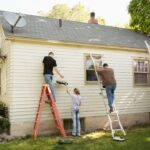Fannie Mae’s SVP and Chief Economist Doug Duncan has authored a new Research and Insights Perspectives Blog post on the fact that older Americans are choosing more and more to age in place (versus downsizing or moving into a seniors living community/facility) and that no imminent supply boost should be expected due to this trend.
Older homeowners (or those 60-plus years old) are fond of their homes they have maintained over the course of their lives and many view them as a financial rock—and are a part of their larger retirement plan—and since home values have done nothing but go up since the Great Recession, they now plan on staying there as long as possible.
Another fact to consider is that 80% of older Americans are homeowners, the largest among all generations. The timing of the potential transition of this cohort away from homeownership has increasingly been a focus of industry stakeholders, particularly given the historically low level of existing home supply.
According to Fannie Mae, in e2022, Americans aged 60-plus represented 29% of the adult population and 44% of homeowners. In the next decade, the 60-plus population is forecast by the Census Bureau to increase to 32% of the total adult population. If household formation and ownership rates remain unchanged from 2022 levels, the change in population levels alone would mean the 60-plus population could approach nearly half of all homeowners in the next decade.
In April 2023, Fannie Mae conducted a research study of a nationally representative group of 1,141 homeowners aged 60-plus. Approximately two-thirds were already retired, and, of those still working, a majority planned to retire in the next five years. All were asked about their financial plan for retirement and the role they expect their home to play in that retirement. An additional group of 307 older homeowners with lower incomes and lower amounts of retirement assets and savings were also surveyed to understand the differences in attitudes and needs among older homeowners facing greater financial constraints. Prior to fielding the survey, we also conducted in-depth interviews with 25 older homeowners to gain deeper insight into their motivations and attitudes, and to better inform the survey work. The details and methodology of our survey, as well as the data and findings, can be found in the research deck.
Key insights from the study on seniors include:
- Older homeowners are confident in their retirement planning: 72% were confident they will have enough income during their retirement, and that confidence grew with age. Economically disadvantaged homeowners were less confident, at 55%.
- Most are not interested in using their home equity as retirement income: Only 15% said that they would consider using their home’s equity for extra funds needed during retirement, and economically disadvantaged owners felt similarly.
- A majority plan to age in place: 56% said they will never sell; 27% said they might sell at some point; and only 17% said they have already sold or plan to sell their home. The retired older adults who sold their homes said they did so for a variety of reasons, including moving to a home that better fits their needs, financial reasons (e.g., lower taxes, lower cost housing), living closer to family/friends, and living in a warmer climate.
- Many report feeling an emotional and financial “lock-in” effect: Older homeowners’ disinclination to move is tied to the love of their home, pride in debt elimination (especially their mortgage), community engagement, and access to known services.
- Although generally averse to debt, there is modest interest in using loan products for home improvement, and nearly half would be interested in a home-maintenance/repair service designed for retirees at a lower cost: 26% expressed interest in a home improvement loan, and 48% were interested in a home-maintenance/repair service at a lower cost, representing the largest interest across programs and services.
- Over one-third are open to retirement advice: 38% said they were open to receiving advice; and the younger the homeowner, the more open they are to receiving retirement advice (43% of those under age 65 vs. 33% of those over age 80).
As outlined below, these insights have broader implications for the overall housing market, including the potential availability of homes for sale, the maintenance of an aging housing supply, home equity product interest, and necessary retirement services.
Click here to read the blog post in its entirety.








